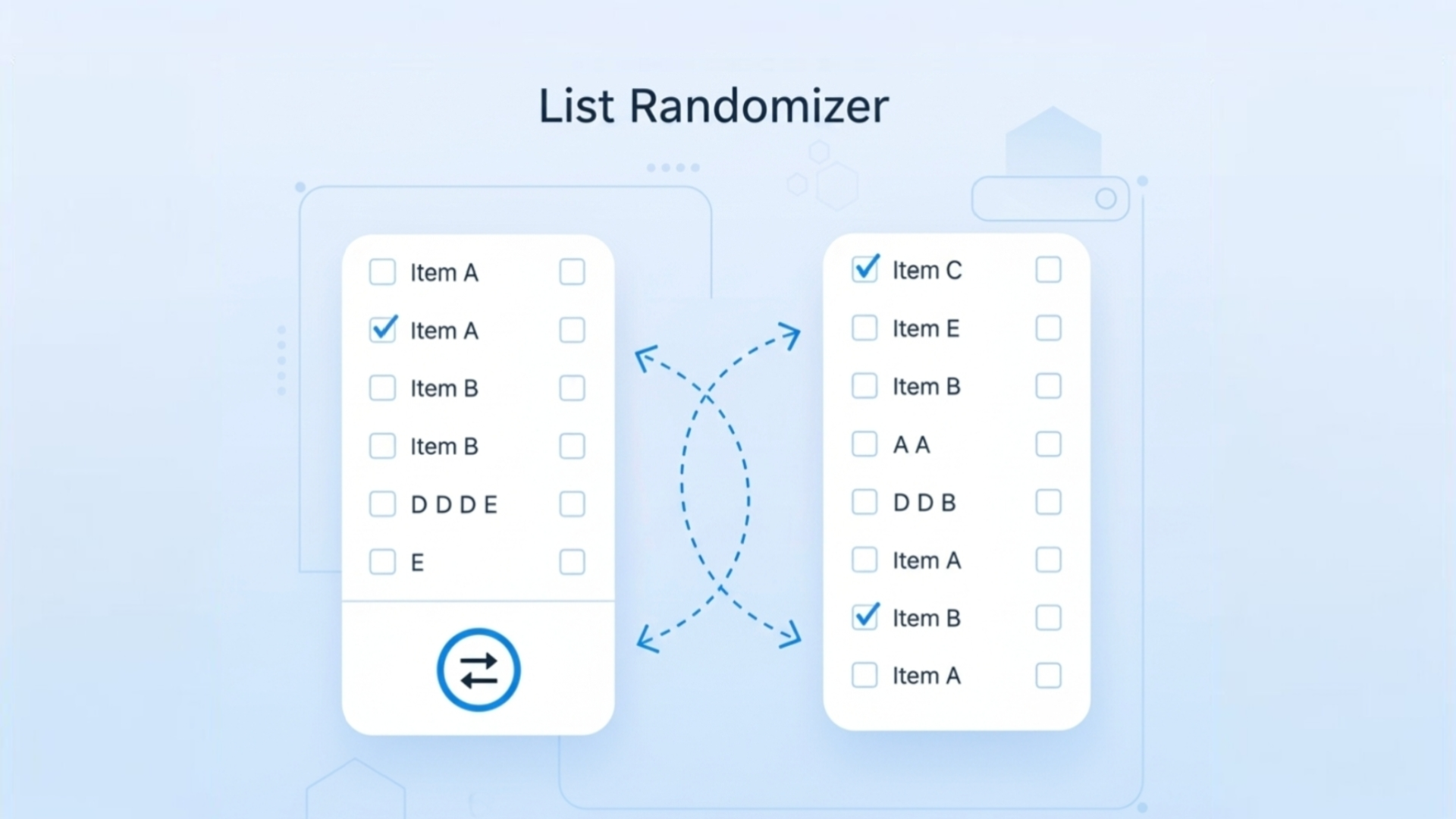
List Randomizer
Created on 15 October, 2025 • Text Tools • 53 views • 2 minutes read
A List Randomizer is a simple but powerful tool that rearranges items in a list into a random order or selects random entries from that list.
List Randomizer: Shuffle, Sample and Reorder Items Quickly
A List Randomizer is a simple but powerful tool that rearranges items in a list into a random order or selects random entries from that list. Useful for teachers drawing student names, product teams choosing features, contest organizers picking winners, and developers testing randomized inputs — list randomizers save time and remove bias by producing unpredictable, fair results.
What Is a List Randomizer?
A List Randomizer takes a collection of items (names, numbers, URLs, tasks, etc.) and outputs them in a randomized sequence. Some tools also support advanced options such as sampling a subset, preventing duplicates, weighting items, or repeating selections. Modern randomizers can work with pasted text, uploaded CSV files, or API calls for programmatic use.
How List Randomizers Work
At their core, most list randomizers rely on a random number generator (RNG) to determine new positions for each item. A common algorithm used for unbiased shuffling is the Fisher–Yates shuffle, which produces a uniform permutation of items. For selecting a subset without repetition, a randomizer can shuffle first and then return the top N items. Weighted randomization assigns selection probabilities so some entries appear more often than others.
1. Input and Parsing
Users provide a list by pasting text, uploading a file, or entering items one per line. The tool parses the input into discrete entries and optionally trims whitespace, removes empty lines, or deduplicates items.
2. Randomization Algorithm
The tool applies a shuffling algorithm or weighted selection method to determine the new order or chosen items. For fairness and reproducibility, some tools let you set a numeric seed that recreates the same random output later.
3. Output and Export
Results appear on-screen and can often be copied, downloaded (CSV or TXT), or sent through integrations (email, webhook, or API). Advanced interfaces may show timestamps, sample history, and export settings.
Common Use Cases for a List Randomizer
List randomizers are versatile across many fields:
- Education: Randomly calling on students, grouping people, or ordering presentations.
- Marketing & Contests: Choosing raffle winners or creating randomized prize draws.
- Software Testing: Providing randomized test inputs to uncover edge cases.
- Events & Operations: Assigning tasks, scheduling rotating duties, or picking session orders.
- Research: Random sampling for surveys or experimental groups.
Best Practices and Tips
To get reliable results from a list randomizer, keep these best practices in mind:
- Use an unbiased algorithm: Prefer tools that implement Fisher–Yates or cryptographic RNGs for fairness.
- Trim and sanitize input: Remove duplicates and blank lines to avoid accidental bias.
- Consider reproducibility: If you need to audit results later, use a seed or logging feature.
- Respect privacy: Avoid uploading sensitive personal data to untrusted services.
- Check weighting carefully: If using weighted picks, verify the weights sum and reflect intended probabilities.
Choosing the Right List Randomizer Tool
When selecting a randomizer, look for features that match your needs: support for large lists, export formats (CSV/TXT), API access for automation, weighted selection, repeat suppression, and clear documentation of the randomization method. Free web-based randomizers are convenient for quick tasks, while enterprise uses may require self-hosted or API-driven solutions for security and scalability.
Conclusion
A List Randomizer is an efficient, impartial way to shuffle lists, sample entries, and automate selection tasks. Whether for classroom management, online contests, software QA, or event planning, the right randomizer increases fairness, speeds decisions, and simplifies workflows. Use a trusted tool, sanitize inputs, and consider reproducibility to get the best results from your randomized lists.
Popular posts
-
BMP To WEBPImage Manipulation Tools • 155 views
-
BMP To ICOImage Manipulation Tools • 101 views
-
BMP To PNGImage Manipulation Tools • 100 views
-
Reverse Ip LookupChecker Tools • 94 views
-
IP LookupChecker Tools • 78 views